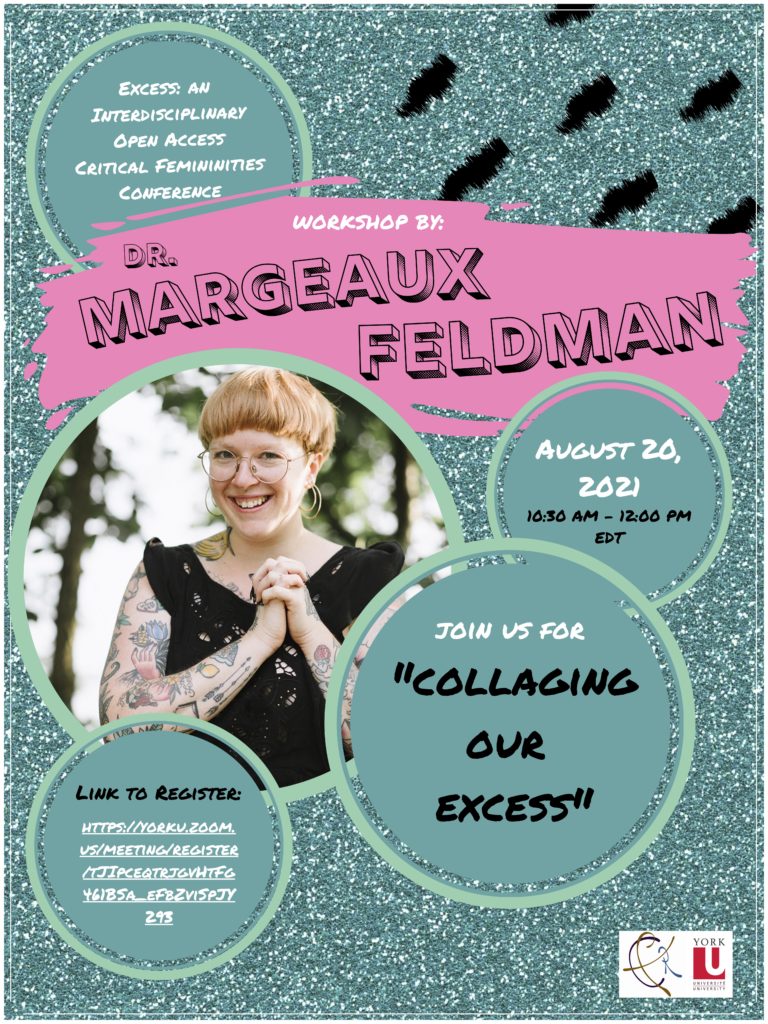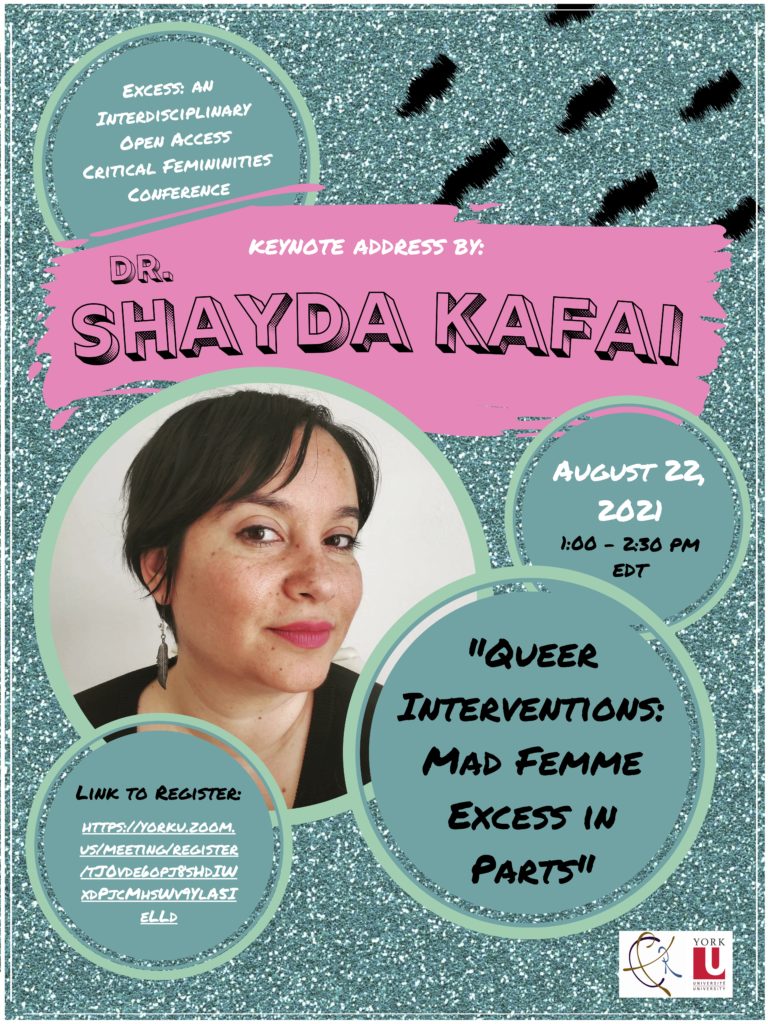Generation: The Fourth Annual Critical Femininities Conference
The Centre for Feminist Research at York University invites abstracts from scholars, researchers, activists, and artists for the fourth annual Critical Femininities Conference on the theme of ‘Generation.’ The conference will take place virtually on August 16-18, 2024.
To generate is to cause, create, or bring about. A generation may refer to a relation in time or the creation of art, scholarship, solidarity, or power. This conference aims to explore the multifaceted dimensions of and attitudes towards femininity across different generations, interrogating how various social, cultural, political, and technological factors intersect with and shape our experiences. In this moment of intergenerational conflicts, climate crisis, and generative AI, the time has come to think critically about our generations and what we generate.
Critical femininities as a discipline and praxis rethinks feminine embodiment under heteropatriarchy and provides an entry point to reclaiming femmeness as an intersectional, complex and generative subjectivity (McCann 2018; Hoskin and Blair 2022; Taylor and Hoskin
2023). The generative aspect of femininity reveals the multidimensional modes of resistance and power that arise in taking up femme identity. Femme and femininity hold generative potentials that are not restrained to regulatory discourses of lack, shame, or failure. In rethinking
femininities and generation, we harken the affective aspects of femme-becomings, accounting for the creative energy that comes with “what a femme body does,” rather than the notion of ‘what a femme body can do’ we have adhered to under systems of oppression (McCann 2018,
118). An affective perspective on femme embodiment and generations offers radical possibilities for femme to be experienced and lived through messy, artful and bodily practices (Athelstan 2015; Kafai 2021; Schwartz 2018).
Feminism has often been chronicled throughout history as a series of generational waves, each with its own distinct approach to gendered issues and its own understanding of femininity (Hemmings 2011; Rampton 2015). While this wave framing has been critiqued as exclusionary
of Black feminists and other marginalized groups (Springer 2002), there remains a strong scholarly interest in the intergenerational feminine and feminist solidarities that extend beyond temporal boundaries (Purvis 2004). Expanding beyond bioessentialist notions of family, queer
communities and scholars have found ways to envision alternative generational kinship structures that eschew heteronormative nuclear family dynamics, especially resisting the limiting performances expected of femmes and feminine subjects (Eguchi and Long 2018). BIPOC,
Queer, Trans, disabled and femme interventions and critiques of the lineages defined by patriarchy, white supremacy, and colonization disrupt hegemonic ideologies that have made these subjects simultaneously hypervisible and invisible in the fabrics of society. Thus, the theme
of ‘generation’ is an act of epistemic resistance to centre voices that have been erased for so long and disrupt taken-for-granted assumptions about what it means to create or bring about.
With this, we invite submissions on generations of femininities for our third annual Critical Femininities Conference. Possible themes may include (but are not limited to):
• Critical interventions and reinterpretations of generation in relation to whiteness, imperialism, colonialization, sexuality, procreation, sex work(ers), disability, and trans femininities
• Femme perspectives and meditations on generation/generators, generations, kinship, and lineage
• BIPOC, Trans, Queer, disability, and femme interventions in and reinterpretations of generational traumas
• Disruptions in intergenerational relationships due to failure of or harm by oppressive actors (e.g. AIDS epidemic; residential schools and sixties scoop; transnational adoption)
• Subjugated knowledges and the generation of popular cultural production and low theory including zines, reality television, street art, animated series, internet cultures, memes, and more
• Modes of intergenerational fem(me)inine and feminist knowledge transmission, relationships, communities, and identities
• Queer, BIPOC, femme, and feminist environmental and anti-capitalist critiques of the generation of wealth, electricity, or products
• Transnational, queer and trans BIPOC critiques and cultures of femininities
• Reimagining femininities across generations and generational nuances in queer feminine kinships
(e.g. sex work, Ballroom culture, drag cultures, lesbian communities, commodified sexualities, and erotic performance)
• Indigenous, Indigiqueer, and Two-Spirit cosmologies of and perspectives on femininity, generation, and kinship
• Decolonial, postcolonial, and Indigenous critiques and cultures of femininities
• Generating art and other forms of creative resistance against normative constructions of femininity.
• Critical disability studies convergence with femme critiques of ‘exhaustion,’ ‘austerity politics’ and ‘debility politics’
• Posthumanism and the Dishuman as a turn to ‘generation’ and creative notions of the body
Submission Guidelines
Submissions can take the form of sole-authored or co-authored academic papers, experimental or artistic presentations, including autotheory, personal narrative, artist talks, visual art and film, poetry, music, storytelling, life-writing, and performance. We welcome submissions from undergraduate students, graduate students, emerging and established scholars, artists, and those working beyond the university. Please send submissions to criticalfemininities@yorku.ca by March 22, 2024.
For single presentations:
Please submit a 250-word abstract that indicates your main argument or focus and the format for your presentation and a 100-word bio (50-word bio for multiple authors). Single presentations should be 15-20 minutes in length and will be organized into thematic panels.
For panel presentations:
Please submit a 250-word abstract that indicates the main theme and format of the panel presentation and 50-word bio for each presenter (minimum of 3 panelists). Group presentations should be no longer than 60 minutes to allow time for Q&A.
For more information and updates you can follow us @crit_fem on Instagram and on our website
Irreverence: The Third Annual Critical Femininities Conference
The Centre for Feminist Research at York University invites abstracts for the third annual Critical Femininities Conference on the theme of “Irreverence.” The conference will take place virtually on August 17-20, 2023.
To be irreverent is to show disrespect where respect is demanded, to be flippant in the face of serious situations, and to satirize what others hold sacred. In western culture, the mother, the virgin, and the queen are figures of femininity that are often held sacred, exemplifying the entrenchment of idealized feminine characteristics such as domesticity, piety, and (hetero)sexual or moral purity. But for decades, irreverence has been woven into camp and poststructuralist approaches to femme theory, which insist that femme is an intentionally ironic performance of this idealized white, cis-heterosexual femininity (Albrecht-Samarasinha 1997; Case 1988; Duggan & McHugh 1996). Irreverent attitudes toward femininity—especially white, heterosexual, and colonial femininities—are also integral to other queer cultures and modes of critique: in recent years, hypersexual and outrageous impersonations of the sacred feminine figures the Virgin Mary and Queen Elizabeth (I and II) have been presented on the mainstage of TV’s Rupaul’s Drag Race. In this way, irreverence has wrought countercultural styles of femininities that relate to punk, drag, sex work, working-class, Indigenous, and racialized sensibilities (Bailey 2014; Chepp 2015; McCann 2016; Padaan 2023).
As the mainstreaming of femme has converged with postfeminist culture, the exaggerated feminine aesthetics associated with femme and other feminine subcultures are increasingly normalized and celebrated, leading to phenomena like: the success of reality TV stars and social media influencers; the rise of bimbo theory; and the imminent resurgence of Barbie. While such phenomena are often scrutinized as anti-feminist and frivolous, they also create space for queer and femme joy, and potentiate both the conceptualization of gender affirmation and the extension of critical femininity discourse beyond LGBTQ+ contexts. At the same time, these phenomena raise questions about: the appropriation of Black cultures and sex worker aesthetics without recognition or political solidarity; the sexism, racism, and fatphobia embedded in western beauty culture; and postfeminism’s undermining of feminist politics (Banet-Weiser 2018). Roxane Gay’s “bad feminist” framework offers one way to navigate such contradictions, acknowledging that we may, occasionally, break with feminist dogma in recognition of our flawed humanity and the pursuit of personal joy.
Importantly, Sara Ahmed’s (2010) figures of the “feminist killjoy” and “affect alien” demonstrate that irreverence is not always gleeful or flippant. On the contrary, it can render serious political critique. As critiques of anti-Black racism, settler colonization, imperial capitalism, and cisheteropatriarchy have become a part of mainstream political discourse and more embedded within cultural and artistic institutions, the ways in which irreverence has historically sustained queer of colour critique, art, fashion, and literature have become more visible, drawing greater attention to how irreverence encourages both the critique of white, western, cishet femininity, and a focus on femininities that exist outside of this normative ideal.
With this, we invite submissions on irreverent femininities for our third annual Critical Femininities Conference. Possible themes may include (but are not limited to):
- Drag culture, media, and the recent moral panics surrounding drag shows
- Respectability politics as it relates to queer, trans, poor/working class, Indigenous, postcolonial, racalized, disabled, fat, and/or sex worker femininities and cultures
- Subjugated knowledges and popular and/or low theory/culture/art, including zines, reality television, street art, animated series, and more
- Internet cultures, social media, and online forms, including selfies, memes, and more
- Bimbo theory and aesthetics
- Femme counterpublics
- Feminist, femme, and postfeminist approaches to beauty culture and politics
- Fashion and style, including camp, Y2K, vintage, clowncore, and more
- Appropriation of and/or solidarities with working-class, racialized, queer, Indigenous, and sex worker aesthetics and communities
- Queer and trans BIPOC critiques and cultures of femininities
- Transnational cultures of femininity
- Indigiqueer and Two-Spirit cultures/cosmologies of femininity
- Punk and other sub-cultures and ethos as related to femininities
- Proto-irreverent femininities and/or irreverent feminine lineages
- Decolonial, postcolonial, and Indigenous critiques and cultures of femininities
- Critical interventions and reinterpretations of reverence and the sacred in relation to whiteness, imperialism, colonialization, sexuality, purity culture, sex work(ers), disability, trans femininities, and more
- Queer, Trans, and/or BIPOC art, literature, and performance
Submission Guidelines
Submissions can take the form of sole-authored or co-authored academic papers, experimental or artistic presentations, including autotheory, personal narrative, artist talks, visual art and film, poetry, music, storytelling, life-writing, and performance. We welcome submissions from graduate students, emerging and established scholars, artists, and those working beyond the university. Please send submissions to criticalfemininities@yorku.ca by May 10, 2023.
For single presentations:
Please submit a 250-word abstract that indicates your main argument or focus and the format for your presentation and a 100-word bio (50-word bio for multiple authors). Single presentations should be 15-20 minutes in length and will be organized into thematic panels.
For panel presentations:
Please submit a 250-word abstract that indicates the main theme and format of the panel presentation and 50-word bio for each presenter (minimum of 3 panelists). Group presentations should be no longer than 60 minutes to allow time for Q&A.
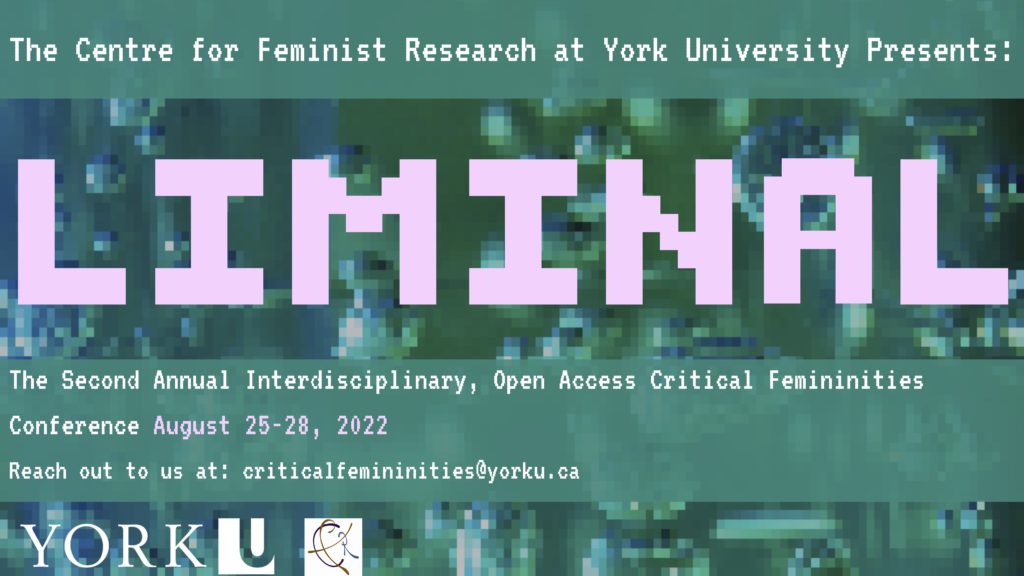
Liminal: The Second Annual Interdisciplinary, Open Access Critical Femininities Conference
The Centre for Feminist Research at York University invites abstracts for the second annual York University Critical Femininities Conference on the theme of “Liminal,” which will take place virtually from August 25-28, 2022. Click here to register.
To be liminal is to be in between or in transition; on the threshold of the sensory, the liminal may produce both hauntings and longings. We present the concept of “femininity” as liminal or palimpsestic itself (Alexander, 2005), inseparable from the ongoing echos of cisheteropatriarchy, colonization, white supremacy, capitalism, ableism, and fatphobia that interpellated it (Brownmiller, 1984; Bordo, 1993; Davis, 1983; Deliovsky, 2008), as well as animated by the simultaneous reverberations of feminist, Black, Indigenous, racialized, trans, and queer interventions which create more capacious futures for femininity (Lorde, 1984; McCann, 2018; Muñoz 1999; Nash, 2011; Rice, 2009; Shraya, 2018). Julia Serano’s (2008) foundational work on transfemininity reveals femininity’s impermanence and malleability, both socially and scientifically (re)constructed. These critical undertakings permit an understanding of femininity as an embodied site of many assemblages and temporalities, transforming it (as well as gender writ large) from a modality of imperial domination into a place of past-present-future becoming and a practice of transgenerational kinship. How might we understand femininity as nonlinear, transitory, and transformative? How might patriarchal phases of femininity be contested or reclaimed?
The field of critical femininities, too, is liminal; still an emergent discipline, critical femininities draws from multiple sites of knowledge and knowledge-production. Femme theory springs not from academia but from the lineage of femme and queer feminist life-writing, often in memoir or edited anthologies that include a range of forms—essays, poetry, art, and photographs (Brightwell & Taylor, 2021; Hollibaugh, 2000; Lorde, 1984; Nestle, 1987, 1992; Pratt, 2005; Schwartz, 2018). The year 2022 presents an opportunity to reflect on the lineage of critical femininity studies; it marks 20 years since the publication of Brazen Femme: Queering Femininity (2002), edited by Chloë Brushwood Rose and Anna Camilleri, and follows the passing of prolific Black feminist bell hooks, whose writing on feminism, belonging, and love gets to the heart of what motivates the generation of critical femininities. The present is an eternally liminal space, caught between past and future; between settler colonialist-white supremacist-cisheteropatriarchal-capitalist histories and the worldings of radical love and transformation still possible. Click here for the full bibliography.
We invite critical, exploratory, reproachful, and celebratory explorations of the liminalities of femme, femininity, and fields of critical femininities and femme theory. Submissions can be conference presentations, or more experimental, including spoken word and poetic expressions, dance and other visual performances, auditory engagements, such as music, song, and storytelling, or any other creative format that expands the boundaries of knowledge production. We welcome submissions from graduate students, junior scholars, and anyone working beyond the university.
We invite submissions on the liminalities of femininity. Possible themes may include (but are not limited to):
- Intersectional critiques and perspectives on femininity and critical femininities, including feminist/trans/nonbinary/queer engagements with the various legacies of “femininity”
- Developing/critiquing the ‘canon’ in critical femininities and/or femme theory
- Femininity and ecological futurities, pasts, and presents
- Feminization of labour and the future of (care) work
- Slow fashion, slow food, and slow scholarship
- Feminine transitions & transformations
- Experiences of/between/beyond girlhood, motherhood, and aging
- Femininity and sexualities
- Queer, crip, and trauma time
- Femininity, disability, and neurodivergence
- Personal and collective archives of femininities
- The feminine and the status of femininity in specific cultures, communities, histories, political movements, or texts (academic, creative, or media)
- Traditions, practices, or rituals of femininity and femme
- Monstrous Femininities: Anti-racist and anti-colonial innovations on femininity, past and present
- Otherworldly femininities, including the sacred, spiritual and digital realms
- Collective reimaginings of femininity beyond the colonial divide
- And more
Please submit a 250 word abstract and 100 word bio to criticalfemininities@yorku.ca by June 15, 2022.
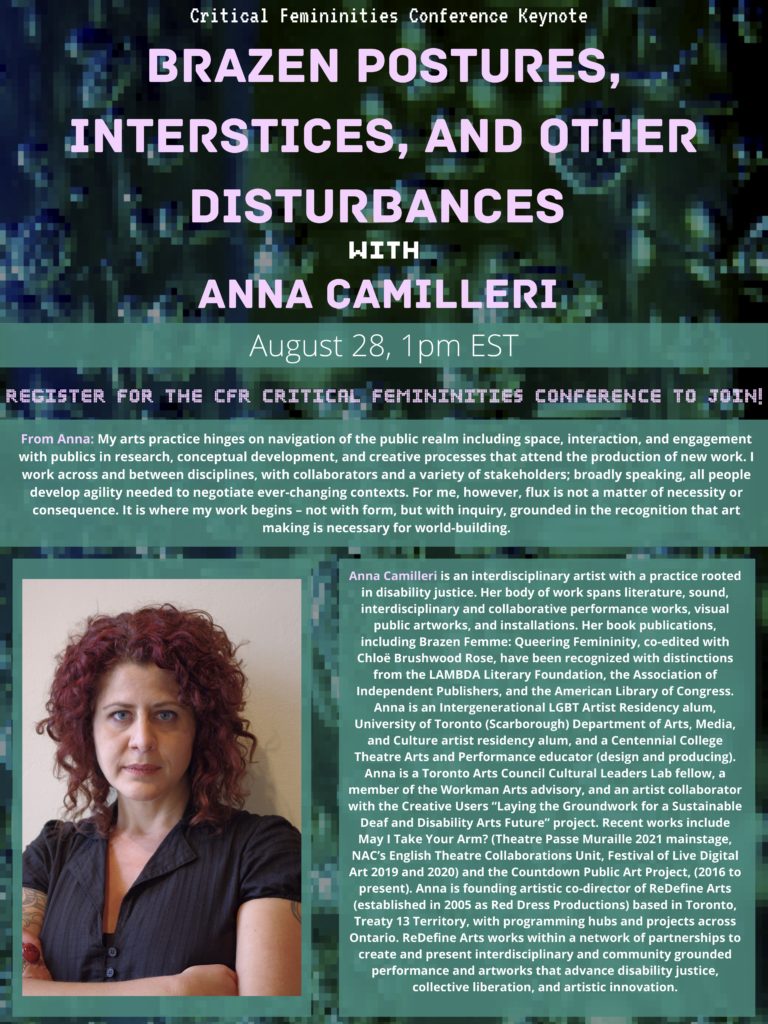

Excess: An Interdisciplinary Open Access Critical Femininities Conference
The Centre for Feminist Research and Sexuality Studies at York University invite abstracts for the first annual York University Critical Femininities Conference on the theme of “Excess,” which will take place virtually from August 19-22, 2021.
“Excess” is the grammar of camp style. It is the signifier of capitalism, the name of inequality, and a warning of environmental collapse. “Excess” is the abject and the affective — those feelings, affects and embodiments that “spill over”, which exceed white supremacist, heteropatriarchal, ableist, and cissexist frameworks of recognition or normative logics of acceptability. Insofar as femininity, and femme, are excessively embodied, excessively artificial, and excessively emotional, “excess” is the charge against femininity — but also its potential resistance. We contend that a critical femininities framework — which moves beyond accounts of (heterosexual) femininity as a site of patriarchal control to unhinge femininity from “woman” and “female” and understand the feminine as a site and form of knowledge (Dahl, 2012) — foregrounds the ways that “excess” and practices of exceeding are mobilized by marginalized communities as strategies of resistance, survival, and celebration. Critical femininities frameworks can be mobilized to frame the politics of excess as potentially emancipatory, opening up the possibilities of queer (femme) futurities, pleasures, protests, and practices of care (Brushwood Rose & Camillieri, 2002; Dawson, 2017; Hollibaugh, 2000; McCann, 2018; Nestle, 1992; Schwartz, 2016, 2018, 2020; Volcano & Dahl, 2008).
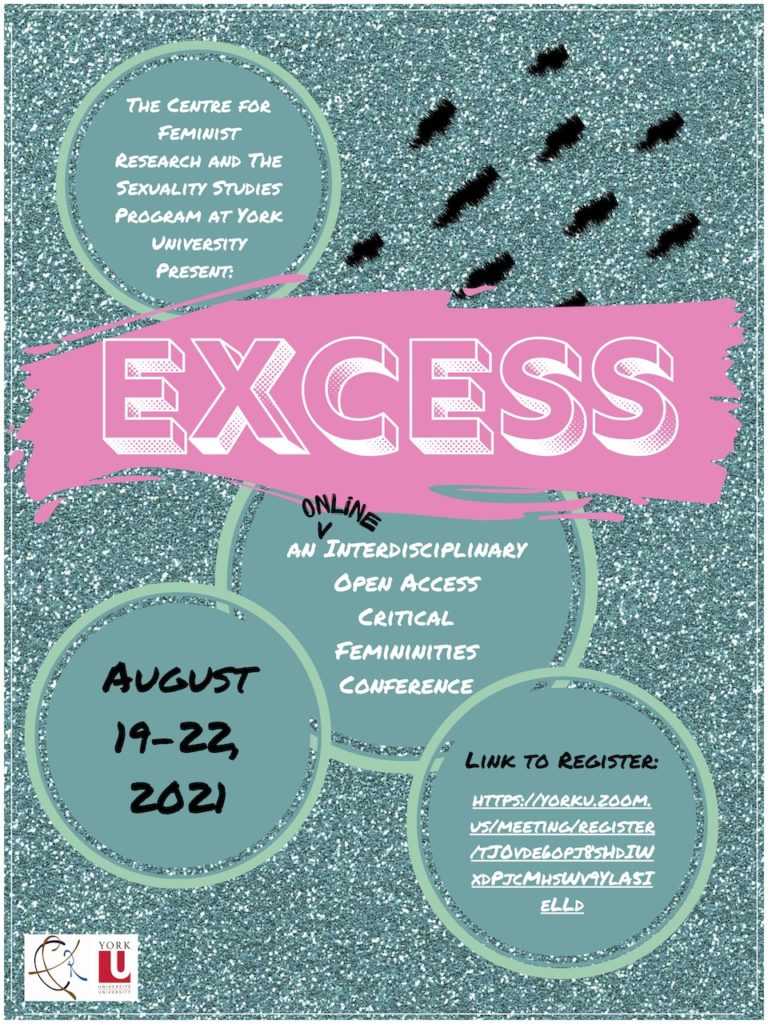
As an interdisciplinary and burgeoning body of thought, a critical femininities framework “exceeds” the boundaries of the academy; Ulrika Dahl (2012) writes, “Equipped with differential consciousness and attending to both pleasure and pain, we might lose the (academic) masculinity complex” (p. 63). We contend that critical femininities, then, offers especially useful entry points into examining how excess orients and drives existing systems of accumulation to the detriment of multiply marginalized communities, often framing these communities as pathological and immoral (Russo 1995; Skelly 2014; Musser 2019), as well as how these communities engage in practices of (potentially joyful) resistance, survival, and care. While excess orients and drives existing systems of capitalist accumulation, it is simultaneously weaponized as pathology and immorality against historically marginalized groups. Jane Skelly writes that “like decadence, the term ‘excess’ has often been used to shame and/or control that which threatens the social order” (2018 p.4): the excessively embodied, excessively emotional, and excessively abject — those traits so closely associated with femininity — only exist in relation to the norms they transgress (Russo, 1995; Skelly, 2014; Skelly, 2018). At the same time, “excess” has been mobilized by marginalized communities as strategies of resistance, survival, and celebration — through expressions of camp, femme, and the field of critical femininities itself.
Critical femininity studies can be understood is its own form of resistance through its embrace of the abject; Dahl (2012) asks, “how might we (re)figure critical femininity studies as centered on that which has always seemingly been the abject antithesis of our very intellectual existence, the speculum of (queer) femininity beyond a simple story of subordination, sexualization, objectification, and superficial narcissism?” (p. 61). Within queer theory, camp has been framed as a modality of reclaiming excess, rendering the “politics of excess” as a practice of resistance. Fabio Cleto (1999) suggests that camp represented a survival strategy vis á vis stigma; it cemented solidarity among queer men coping with a hostile reality, and “celebrated the power of style, make-believe, and crafted arabesques of indirect self-expression” (p. 35). Similarly, Andrew Ross (1989) positions camp as part of a survivalist culture that found a way of imaginatively expressing its common conquest of everyday oppression.
Femme is sometimes understood as a camp version of femininity (Case, 1988), similarly reclaiming, mocking, and subverting the excess of femininity (and even gender itself). In all its excess, passivity, and artificiality, femmes have understood femininity as a mode for sexual healing, wholeness, and other pleasures (Nestle, 1992; Albrecht-Samarasinha, 1997; Cvetkovich, 2003; McCann, 2018); a method to queer and subvert gender (Duggan & McHugh, 1996; Hollibaugh, 2000; Brushwood Rose & Camilleri, 2002; Hoskin & Taylor, 2019); a catalyst for community formation (Volcano & Dahl, 2009; Connell, 2012; Nicholson, 2014; Schwartz, 2016, 2020); and a site of politics and theory (Dahl, 2012, 2014; Brightwell, 2017; Dawson, 2017; Schwartz, 2018, 2020; Hoskin, 2017, 2019; Brightwell & Taylor, 2019; Scott, 2019).
While femme is already many things and excess is already too much, we seek to expand the dialogue around femininity, femme, excess, and the possibilities and limits of both. We seek proposals for panels, papers, and other presentations that explore the possibilities, limitations, poetics, aesthetics, and politics of fem(me)inine excess and an excess of fem(me)ininities.
We invite graduate students and emerging scholars in critical femininities, artists, and community actors to draw on critical femininities frameworks, especially intersectional approaches, to consider excess in both its disciplining and emancipatory possibilities, by contributing:
Research notes or full scholarly papers, which may be conventional or draw on autoethnography, research poems, body mapping or other artistic techniques
An artwork to be shared, performed or presented, including paintings, sculpture, a short film, a digital or conventional print
A community project or poster presentation
Possible themes may include (but are not limited to):
- Intersectional perspectives on critical femininities
- Decolonizing and post-colonial engagements with femininities
- Critical race perspectives on femininity and excess
- Critical femininities and the disciplining power(s) of excess (e.g. as pathology, criminality, or disgust)
- Critical femininities and femme futurities
- Femme communities and femme assemblages
- Femme aesthetics and camp
- Feminization of poverty
- Critical femininity perspectives on bodies and bodyminds in excess (e.g. Fat studies, Mad studies, critical disability and Crip theory perspectives)
- The affective dimensions of “excess”
- Excess as pedagogy, method, or epistemology
- Reclaiming “excess” from marginalized perspectives
- Pleasure, playfulness, and excess
- Excess as detriment, inequality, or other critical perspectives on excess
- And more!
Participants will be expected to present their paper, artwork/performance or community project during a 15-20 minute presentation. All accepted submissions will be virtually offered as synchronous presentations, unless an asynchronous presentation, panel, performance, or exhibition is requested by the submitting presenter.
Please include the following in your submission:
- Presentation Title
- Proposed Format (Presentation, Panel, Performance, Visual Art)
- Author name(s) and email(s)
- Affiliation(s)/ Organization(s)
- Biographical Note(s) (100-150 words per author):
- Audiovisual Needs (PowerPoint, etc).
- Presentation proposals must include a title and 250–300-word abstract.
Panel submissions are welcome. Panels (3-4 presentations) must be organized around a central topic, theme, or approach. The proposal, in addition to the above, must include the following, all in a single document:
- A panel title and 100-word abstract illustrating the connections between each of the presentations.
- For each presentation— a title and 250–300-word abstract
Please submit panel proposals, presentation abstracts, and queries to excessconference2021@gmail.com no later than May 21, 2021.
